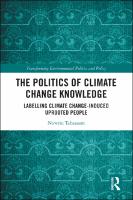The Politics of Climate Change Knowledge
Proposal review
Labelling Climate Change-induced Uprooted People
| dc.contributor.author | Tabassum, Nowrin | |
| dc.date.accessioned | 2022-03-03T11:39:14Z | |
| dc.date.available | 2022-03-03T11:39:14Z | |
| dc.date.issued | 2022 | |
| dc.identifier | ONIX_20220303_9781000546064_23 | |
| dc.identifier | ONIX_20220303_9781000546064_23 | |
| dc.identifier | OCN: 1273727523 | |
| dc.identifier.uri | https://library.oapen.org/handle/20.500.12657/53230 | |
| dc.description.abstract | This book addresses political knowledge of climate change and its relation to labelling people affected by climate change, either as ‘climate refugees’ or as ‘climate change-induced displaced people or migrants’. By questioning the knowledge of climate change and subsequent labelling of people, this book will spark debate in studies of global climate politics and transnational policy networks. Rather than considering the issue of climate change as a given phenomenon, the author explores how the politicized knowledge of climate change has been produced in international negotiations and how that knowledge is transmitted from global forums to local country levels via climate change action plans and resilience projects. This book introduces the concept of multi-scalar knowledge brokers (MKBs) – individual actors who work at multiple levels (local, national, and international) to transmit the knowledge of climate change from global level to local level. The author uses the primary case study of Bangladesh to demonstrate how the dominant actors in global climate politics – the Intergovernmental Panel on Climate Change (IPCC), the United Nations Framework Convention on Climate Change (UNFCCC), and the World Bank, as well as the USA and the UK – interact with the government and local NGOs in Bangladesh regarding transmitting the knowledge of climate change, labelling the uprooted people, and implementing resilience projects. This book will be of interest to students, scholars, and practitioners of international relations, environmental politics, climate change studies, political ecology, political geography, and migration and displacement studies. | |
| dc.language | English | |
| dc.relation.ispartofseries | Transforming Environmental Politics and Policy | |
| dc.subject.classification | thema EDItEUR::J Society and Social Sciences::JP Politics and government | en_US |
| dc.subject.other | bangladesh | |
| dc.subject.other | climate change | |
| dc.subject.other | climate finance | |
| dc.subject.other | climate refugee | |
| dc.subject.other | diplacement | |
| dc.subject.other | ecology | |
| dc.subject.other | economic resilience | |
| dc.subject.other | environmental politics | |
| dc.subject.other | global climate politics | |
| dc.subject.other | IPCC | |
| dc.subject.other | knowledge network theory | |
| dc.subject.other | migrant | |
| dc.subject.other | migration | |
| dc.subject.other | multi-scalar knowledge broker | |
| dc.subject.other | transnational | |
| dc.subject.other | UNFCCC | |
| dc.title | The Politics of Climate Change Knowledge | |
| dc.title.alternative | Labelling Climate Change-induced Uprooted People | |
| dc.type | book | |
| oapen.identifier.doi | 10.4324/9781003038283 | |
| oapen.relation.isPublishedBy | 7b3c7b10-5b1e-40b3-860e-c6dd5197f0bb | |
| oapen.relation.isFundedBy | Knowledge Unlatched | |
| oapen.relation.isbn | 9780367692421 | |
| oapen.relation.isbn | 9780367481582 | |
| oapen.collection | Knowledge Unlatched (KU) | |
| oapen.imprint | Routledge | |
| oapen.pages | 180 | |
| peerreview.anonymity | Single-anonymised | |
| peerreview.id | bc80075c-96cc-4740-a9f3-a234bc2598f1 | |
| peerreview.open.review | No | |
| peerreview.publish.responsibility | Publisher | |
| peerreview.review.stage | Pre-publication | |
| peerreview.review.type | Proposal | |
| peerreview.reviewer.type | Internal editor | |
| peerreview.reviewer.type | External peer reviewer | |
| peerreview.title | Proposal review | |
| oapen.review.comments | Taylor & Francis open access titles are reviewed as a minimum at proposal stage by at least two external peer reviewers and an internal editor (additional reviews may be sought and additional content reviewed as required). |

